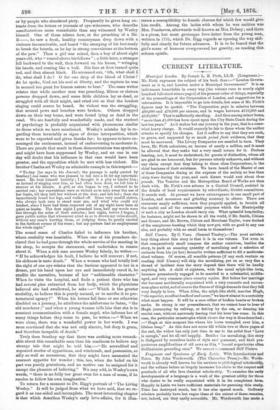CURRENT LITERATURE.
Municipal London. By Joseph L. B. Firth, LL.B. (Longmans.)— Mr. Firth expresses the subject of his book thus :—" London Govern- ment as it is, and London under a Municipal Government." It is an indictment formidable in every way (the volume runs to nearly eight hundred full-sized octavo pages) of the present order of things, especially of the proceedings of the Corporation of London, and suggestions for a reformation. It is impossible to go into details, but some of Mr. Firth's figures may be quoted. " The Corporation pays in salaries between £ 60,000 and £70,000 per annum, and in wages between £110,000 and
£ 120,000." That is sufficiently startling. And then among minor items, "more than £1,000 has been spent upon the City State Coach during the last ten years." As it makes but one journey in the year, that is a some- what heavy charge. It would scarcely be fair to those whom the author attacks to specify his charges. Let it suffice to say that they are such, so grave, and supported by so much prima facie evidence, that they must be answered. The Livery Companies are assailed in turn. They have, Mr. Firth calculates, an income of nearly a million, and it must be allowed that they make but a very small return for it. Profase feasting, not, it must be understood, for guests of distinction, whom all are glad to see honoured, but for persons utterly unknown, and without any claim except that they belong to these close Corporations, is the chief business of their existence. We have heard of the Master of one of these Companies dining at the expense of the society no less than sixty times during the year, and each dinner would cost about three pounds. The Vestries and the Metropolitan Board of Works are then dealt with. Mr. Firth's own scheme is a Central Council, assisted in the details of local requirements by subordinate, district committees. It sounds well. At present we have extravagance in one small part of London, and meanness and grinding economy in others. There are resources amply sufficient, were they properly applied, to furnish all the useful and all the ornamental purposes which the Municipality of such a city as London should carry out. What splendid hospitality, for instance, might not be shown to all the world, if Mr. Smith, Citizen and Grocer, and Mr. Brown, Citizen and Merchant Taylor, were docked of the sumptuous feasting which they now get, with no good to any one else, and probably with no small harm to themselves 1


































 Previous page
Previous page